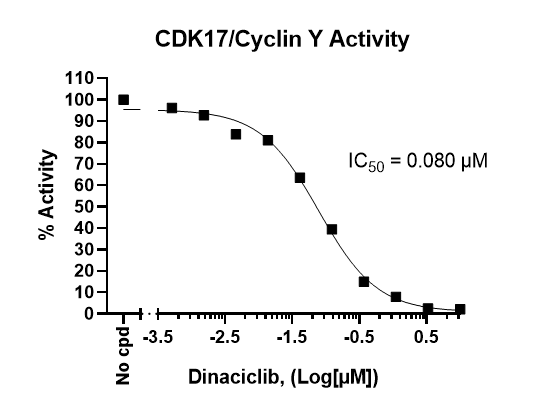Chemi-Verse™ CDK17/Cyclin Y Kinase Assay Kit
The Chemi-Verse™ CDK17/Cyclin Y Kinase Assay is a luminescent assay designed to measure CDK17 (cyclin-dependent kinase 17)/Cyclin Y kinase activity for screening and profiling applications using ADP-Glo™ as a detection reagent. The assay kit comes in a convenient 96-well format, with enough purified recombinant complex of CDK17/Cyclin Y, kinase substrate, ATP, and kinase assay buffer for 100 enzyme reactions.
- ADP-Glo™ Kinase Assay (Promega #V6930)
- DTT (Dithiothreitol), 1M, optional
- Microplate reader capable of reading luminescence
- Adjustable micropipettor and sterile tips
- 30°C incubator
| Catalog # | Name | Amount | Storage |
| 100606 | CDK17/Cyclin Y, GST-Tag Recombinant* | 5 µg | -80°C |
| 79334 | 5x Kinase Assay Buffer 1 | 1.5 ml | -20°C |
| 79686 | 500 µM ATP | 50 µl | -20°C |
| 79604 | 5x CDK Substrate Peptide 2 | 125 µl | -20°C |
| 79696 | White 96-well plate | 1 | Room Temp |
*The concentration of the protein is lot-specific and will be indicated on the tube.
CDK17 (cyclin dependent kinase 17, also known as PCTK2) is a member of the cyclin-dependent protein kinase family involved in cell cycle regulation, transcription and splicing. CDK associates with cyclins, which induce a conformational change that results in a dramatic increase of the kinase activity. Cyclin levels vary during the cell cycle, which allow cyclins to regulate CDK activity in the cell. Dissociation of the complex returns CDK to its basal activity, and CDK is degraded by ubiquitin mediated proteolysis. Lack of regulation in cell cycle can result in apoptosis and finally in cancer, neurodegenerative diseases (Alzheimer’s or Parkinson disease) and cardiovascular complications (stroke). The understanding of the mechanisms involved in cell cycle regulation, and its control via the use of small molecule inhibitors will open new therapeutic avenues for the treatment of cancer and neurodegenerative diseases.


